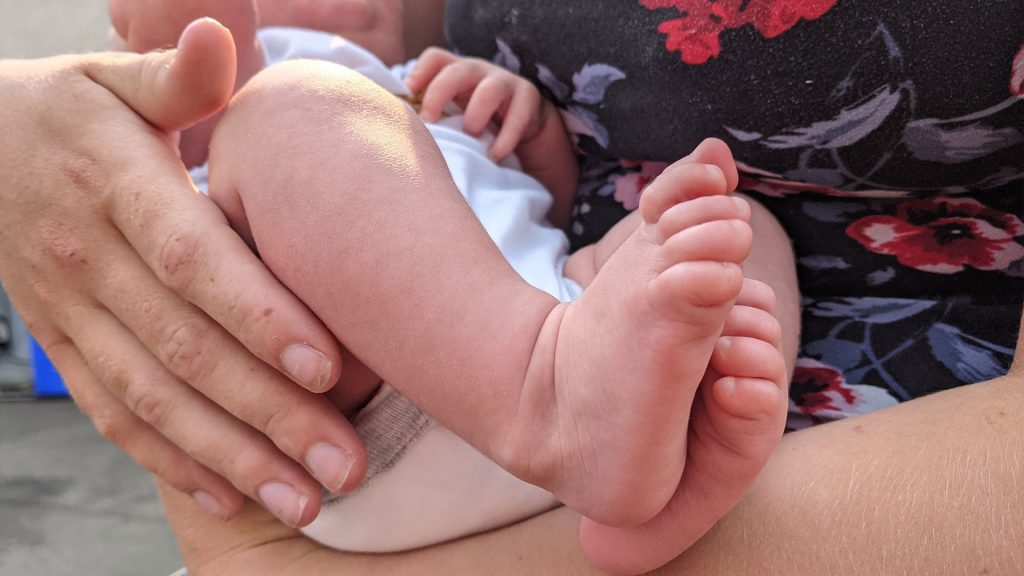
Recalling her experience of a birth alert, this mom told IndigiNews, “I could barely breathe because it was just so painful.” Photo by Brielle Morgan/IndigiNews
A dispute over birth alert records involving British Columbia, IndigiNews and the province’s privacy commissioner is heading for the B.C. Supreme Court.
B.C.’s Ministry of Children and Family Development (MCFD) is fighting to keep records about birth alerts under wraps — records that could have important implications for parents in B.C. who were subjected to birth alerts.
The case — slated to be heard June 12 and 13 — stems from government documents that were acquired by IndigiNews through a freedom of information request.
The records revealed important information about birth alerts, including a memo calling them “illegal and unconstitutional” four months before the practice was banned.
The ministry asked IndigiNews to “return the entire records package” and refrain from publishing the records, saying information had been released in error, but we published anyway.
At the same time, IndigiNews asked B.C.’s privacy commissioner to review pages that had been entirely blacked out, making them unreadable.
B.C.’s Office of the Information and Privacy Commissioner (OIPC) has a mandate to “investigate, mediate and resolve appeals concerning access to information disputes.”
In December, the OIPC ordered MCFD to provide it with “all of the disputed information,” and allow one of its adjudicators to decide whether the ministry’s redactions were legal. But MCFD refused to share the blacked-out information.
Instead, MCFD asked B.C.’s Supreme Court to review the OIPC’s order and consider tossing it out.
‘A gross violation of the rights of the child, the mother, and the community’
A “birth alert” or “hospital alert” is when a social worker flags an expectant parent to hospital staff without their consent, requiring hospital staff to contact “child protection” authorities once the baby is born.
These alerts can lead to newborns being apprehended — meaning they’re taken from their parents by social workers employed by MCFD, or a delegated agency.
In 2018, 24 per cent of parents in B.C. who were subjected to birth alerts had their little ones taken by social workers within a week of baby’s birth, according to records obtained by IndigiNews. That number climbed to 39 per cent when taking into account the weeks and months to follow.
Indigenous families are disproportionately affected by this practice. In fact, the National Inquiry into Missing and Murdered Indigenous Women and Girls called birth alerts “racist and discriminatory and … a gross violation of the rights of the child, the mother, and the community” in its final report, published in June 2019.
In B.C., for example, 58 per cent of parents subjected to birth alerts in 2018 were Indigenous, according to data from MCFD.
In 2020, IndigiNews filed a freedom of information request with MCFD, asking for “all records including briefing notes and reports of birth alerts from June 1, 2019 to Sept. 1, 2020.”
In response, we received 68 pages of government documents, including a letter prepared for then-MCFD-minister Katrine Conroy, dated June 28, 2019.
This letter says that “the Ministry of the Attorney General (MAG) confirmed that the use of hospital alerts, and other activities involving the disclosure of information without the consent of expectant parents is both illegal and unconstitutional” in a May 6, 2019, memo to MCFD.
It also says: “Although there has been no legal action taken in B.C. since the practice of hospital alerts began, this may create a future litigation risk.”
When the IndigiNews team learned that the province had described its own practice as “illegal and unconstitutional” four months before formally discontinuing that practice, we reached out to MCFD and David Eby — the premier of B.C. who was the province’s attorney general at the time — for comment.
In response, IndigiNews received a letter on Jan. 8, 2021, from a lawyer acting on behalf of MCFD, requesting that IndigiNews “return the entire records package” and to “refrain from retaining or disseminating those records or its contents in any way.”
The letter stated that some information in the package was “subject to solicitor client privilege” and had been released “in error.”
IndigiNews did not return the records. On Jan. 12, 2021, IndigiNews published a story about the alleged illegality of birth alerts, linking to the disputed records.
Meanwhile IndigiNews asked B.C.’s privacy commissioner to review the records, and consider ordering the province to reveal information withheld on pages 33-34 and 47 of phase one of the records and page two of phase two of the records.
Birth alerts are a matter of ‘public interest’
Under B.C.’s privacy law, the government has the right to withhold information. It can do this to protect solicitor client privilege or an individual’s privacy rights. It can also withhold advice or recommendations developed by or for a public body or a minister.
But section 25 of B.C.’s Freedom of Information and Protection of Privacy Act, acts as a sort of trump card. It “stipulates that the head of the public body must disclose information where disclosure is clearly in the public interest.”
IndigiNews has argued that B.C.’s position on birth alerts is very much in the public interest.
“If the [attorney general] has determined that these alerts are illegal and laid out a legal rationale for this opinion, this information could compel other jurisdictions to stop using birth alerts and start implementing less harmful, preventative and voluntary supports,” IndigiNews submitted to the OIPC in a section 25 argument on Feb. 2, 2021.
“It’s also in the public interest to know why [MCFD] continued to carry out an ‘illegal and unconstitutional’ practice for months after receiving this characterization from the AG’s office,” IndigiNews argued.
“And it’s in the public interest to know why the government is [apparently] not notifying families who were subject to birth alerts.”
Because two whole pages have been withheld from the records in dispute, it’s hard to say exactly what’s been omitted, so IndigiNews asked the OIPC to step in.
On December 9, 2022, OIPC adjudicator Elizabeth Barker ordered MCFD to provide “all of the disputed information” to the OIPC — so they can decide if section 25 applies. The ministry refused to provide this information to the oversight body, citing solicitor-client privilege.
On December 22, the ministry petitioned the B.C. Supreme Court, asking it to toss out Barker’s order. It’s also asking the court to declare that “section 25 of FOIPPA does not abrogate solicitor client privilege.” If the court won’t grant these requests, the ministry’s asking it to send the case back to the OIPC for a rehearing.
This is just one of three ongoing disputes between IndigiNews and various provincial ministries over information that’s been withheld from records about birth alerts. The other two cases are also being investigated by the OIPC.
‘I want to try to hold the government accountable’
Meanwhile, several law firms have proposed class action lawsuits on behalf of parents who’ve been subjected to birth alerts in colonial jurisdictions across “Canada.” The first such suit was filed by Camp Fiorante Matthews Mogerman LLP (CFM) in B.C. in September 2021.
“Calling out the government for what it did can help to remove the stigma and shame from other people who have experienced this,” said Nikida Steel, the proposed representative plaintiff, in a statement released by CFM on Sept. 1, 2021.
“I want to try to hold the government accountable, and to prevent this type of reprehensible behaviour in the future.”
According to CFM’s filed statement of claim, Steel — who is Indigenous — was subject to multiple birth alerts, which resulted in “serious and prolonged emotional and psychological harm, including grief, humiliation, emotional trauma, loss of dignity, and a deep sense of personal violation because her private and personal information was disclosed without her knowledge or consent.”
Before a class action suit is heard, it has to be certified by the courts. According to CFM lawyer Chya Mogerman, the certification hearing for the proposed B.C. suit is due to start in the B.C. Supreme Court in November.











